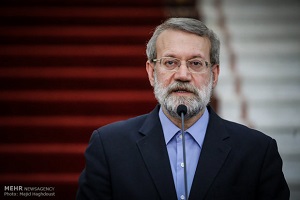Parliament Speaker Larijani said certain political difference, by counseling certain facts, undermine Iran’s great Revolution which impressed the whole Islamic world.

Addressing the Parliament’s Monday open session, Ali Larijani
delivered a speech on the occasion of the 38th anniversary of the
victory of Islamic Revolution.
After extending heartfelt congratulations to the Iranian nation and
MPs on Fajr Decade, the official said "upon arrival in Iran in 1979,
Imam Khomeini brought about a big change which can be dubbed as the
largest reordering of the century as it brought an end to the
dictatorship of Shah who deemed representativeness of the US as his
greatest honor.”
He recalled that in Imam Khomeini’s theory, the government was
founded on Islamic thoughts and people were the main rulers as evidenced
by the title ‘Islamic Republic’ which embraces the two main principles.
"In Imam’s view, people were centerpieces in all domestic issues be
it in politics, economy or culture. All governmental organizations were
establishing via direct voting of people as the Parliament, as the
essence of people’s will, was placed on top of all issues.”
He said independence in all sectors was introduced by Imam Khomeini
as the root of national dignity which was shown in the ‘Neither East nor
West’ principle as the main axis of Iran’s diplomacy; "even though
world powers disliked the policy and imposed Saddam’s war against Iran,
they were eventually forced to end the battle after finding out that
Iranians were indefatigable in fights.”
He emphasized that Imam’s policies have undoubtedly brought
prosperity to the nation; "Iran, which was previously disfavored by
Islamic states for its support of the Zionist regime, has now turned
into the main axis of resistance and development.”
Larijani said Iran had achieved knowhow of nuclear energy despite
international pressures and could maintain the knowledge following a
nuclear deal adding "Iran is also the main power in the fight against
terrorism though 60 large countries are only seeking to deal with the
issue on paper.”
As regards economic independence, Imam Khomeini encouraged the youth
to become self-sufficient in areas of new technologies and we could
obtain missile capabilities during the war despite all sanctions, he
continued.
Parliament speaker of Iran went on to enumerate numerous economic
achievements of Iran as from the Islamic Revolution including the
significant rise in share of various industries in the country’s GDP.
He expounded on noticeable progress made in agriculture, literacy,
health insurance, transportation, telecommunications as well as energy
sectors and provided detailed statistics on every field.
Later into his remarks, Ali Larijani regretted to say that certain
adverse measures, rooted in political competitiveness, were undermining
significance of Islamic Revolution.
He urged that coverage of the Revolution be expanded rather than
removing certain directors and managers from circle. The official
stressed that investments had to be made on commonalities between
politicians and directors rather than their differences.
He reassured that existing issues like inflation could be resolved
through national unity and determination rather than focusing on
marginal issues.
Parliament speaker later touched upon an article entitled ‘Why do we
like Iran?’ composed by an Egyptian politician saying, the author has
enumerated nine reasons to support his claim.
"The first reason is that Iranian authorities, unlike Arab ones,
spared no effort in line with powerful development of their country,”
said Larijani.
He said the second reason was Iran’s progress in scientific, cultural
and technological areas though Arabs have remained in a standstill in
this regard; "the third was that Iran made developments in controlling
Israel’s nuclear power.”
Reason number four was that Iran supported the Resistance Front by
supplying weapons and consultations while Arabs are against the Front.
He said the fifth reason was that Iranian authorities firmly opposed
Israeli-American plots at a time when Arab leader back these projects.
"The next factor was that Iranian leaders, unlike Arabs, were not
after sabotage or gathering wealth and the seventh reason was that
Americans were desperately after talks with Iran.”
Larijnai noted that the eighth reason was that Iranians were in
charge of appointing or changing their leaders while Arab authorities
merely ruled upon people; "the last reason why they like Iran was that
Iranians are their Muslim neighbor who are against divisive measures.”
He invited Members of the Parliament (MPs) to appreciate the Islamic Revolution by truly serving the honorable people of Iran.
(MEHR)
